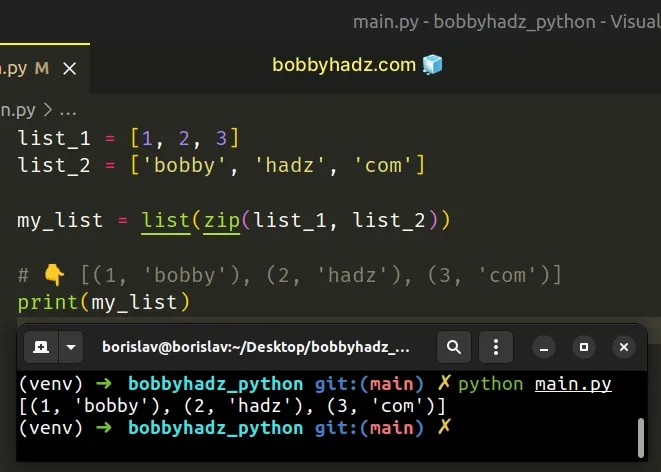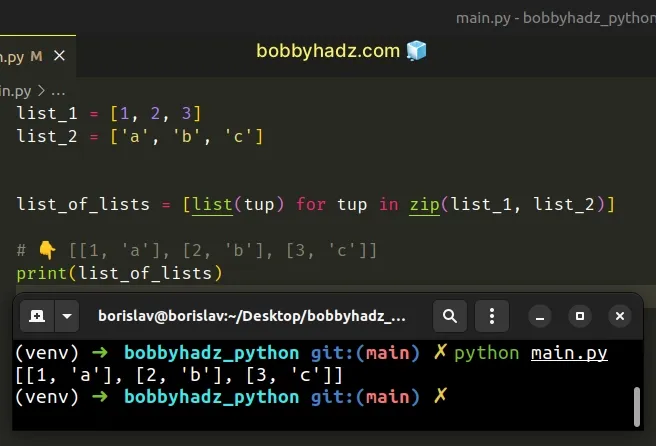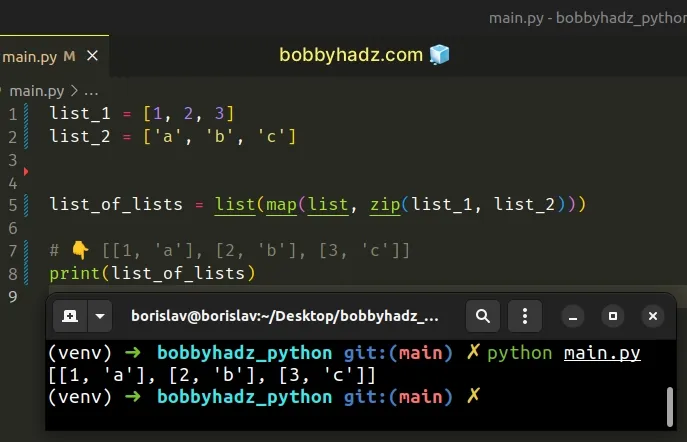How to Print a Zipped list in Python
Last updated: Apr 9, 2024
Reading time·3 min

# Table of Contents
# Print a zipped list in Python
To print a zipped list:
- Use the
zip()function to get an iterator of tuples. - Use the
list()class to convert the iterator to a list. - Use the
print()function to print the list.
list_1 = [1, 2, 3] list_2 = ['bobby', 'hadz', 'com'] my_list = list(zip(list_1, list_2)) # 👇️ [(1, 'bobby'), (2, 'hadz'), (3, 'com')] print(my_list)

The zip() function iterates over several iterables in parallel and produces tuples with an item from each iterable.
The zip function returns an iterator of tuples.
list_1 = [1, 2, 3] list_2 = ['bobby', 'hadz', 'com'] zip_obj = zip(list_1, list_2) # 👇️ <zip object at 0x7fb7621fe080> print(zip_obj)
This is why we had to use the list() class to convert the zip object to a
list.
list_1 = [1, 2, 3] list_2 = ['bobby', 'hadz', 'com'] zip_obj = list(zip(list_1, list_2)) # 👇️ [(1, 'bobby'), (2, 'hadz'), (3, 'com')] print(zip_obj)
You can use the zip() function with as many iterables as necessary.
list_1 = [1, 2, 3] list_2 = ['bobby', 'hadz', 'com'] list_3 = ['one', 'two', 'three'] zip_obj = list(zip(list_1, list_2, list_3)) # 👇️ [(1, 'bobby', 'one'), (2, 'hadz', 'two'), (3, 'com', 'three')] print(zip_obj)
The zip() function returns a zip object of tuples.
# Zip with list output instead of Tuple in Python
To get list output instead of tuple from the zip() function:
- Use a list comprehension to iterate over the
zipobject. - Use the
list()class to convert each tuple to a list. - The new list will contain nested lists instead of tuples.
list_1 = [1, 2, 3] list_2 = ['a', 'b', 'c'] list_of_lists = [list(tup) for tup in zip(list_1, list_2)] # 👇️ [[1, 'a'], [2, 'b'], [3, 'c']] print(list_of_lists)

The zip() function iterates over several iterables in parallel and produces tuples with an item from each iterable.
By default, the zip function returns an iterator of tuples.
list_1 = [1, 2, 3] list_2 = ['a', 'b', 'c'] # 👇️ [(1, 'a'), (2, 'b'), (3, 'c')] print(list(zip(list_1, list_2)))
We used a
list comprehension to
iterate over the zip object.
On each iteration, we used the list() class to convert the tuple to a list.
list_1 = [1, 2, 3] list_2 = ['a', 'b', 'c'] list_of_lists = [list(tup) for tup in zip(list_1, list_2)] # 👇️ [[1, 'a'], [2, 'b'], [3, 'c']] print(list_of_lists)
The list class takes an iterable and returns a list object.
Alternatively, you can use the map() function.
# Zip with list output instead of Tuple using map()
This is a two-step process:
- Use the
map()function to pass each tuple in thezipobject to thelist()class. - Use the
list()class to convert themapobject to a list.
list_1 = [1, 2, 3] list_2 = ['a', 'b', 'c'] list_of_lists = list(map(list, zip(list_1, list_2))) # 👇️ [[1, 'a'], [2, 'b'], [3, 'c']] print(list_of_lists)

The map() function takes a function and an iterable as arguments and calls the
function with each item of the iterable.
map() function passes each tuple in the zip object to the list() class.The map() function returns a map object, so we had to use the list() class
to convert it to a list.
Which approach you pick is a matter of personal preference. I'd go with using a list comprehension because I find it more explicit and easier to read.
# Additional Resources
You can learn more about the related topics by checking out the following tutorials:
- How to Print a List in Columns in Python
- Print a List without the Commas and Brackets in Python
- How to Print specific items in a List in Python
- How to print Bold text in Python [5 simple Ways]
- Check the syntax of a Python script without executing it
- How to Wait for subprocess(es) to finish in Python
- Using nested Loops to print a Rectangle in Python
- Python: Don't run a module's code when it is imported
- How to shift (rotate) a List in Python [5 Ways]
- How to keep a Python script output Window open
- How to create a Zip archive of a Directory in Python
- Check if a List is Sorted (ascending/descending) in Python

